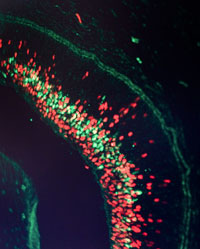Telias receives RPB Career Development Award
When vision scientist Michael Telias, PhD, arrived in Rochester last December as one FEI’s newest faculty members, he hit the ground running. In literally the blink of an eye, he organized and started a clinical trial to test how a common drug used to treat alcoholism might improve vision in people with diseases like retinitis pigmentosa and macular degeneration. He was also invited to Washington, joining a handful of promising young scientists who were selected to present their research to members of Congress.
Hard work and dedication to his craft continue to pay off as he was recently awarded a Career Development Award (CDA) from Research to Prevent Blindness. These competitive grants are for the express purpose of accelerating the trajectories of early career scientists as they establish their laboratories. Like venture capital for vision researchers, CDAs allow their recipients to do out-of-the-box science that often results in innovations, leading to publications and additional funding from the National Institutes for Health. They are catalysts for careers and cures.
Telias will use his $350,000, award during the next four years, to discover new pathways that may improve the quality of vision in persons suffering from the consequences retinal ganglion cell (RCG) remodeling. RCGs are the nerve cells that are the starting point for the electro-chemical journey of visual signals to the brain where they are decoded as vision.
Remodeling of RCGs occurs when the light gathering cells in our eyes – called photo receptors – die in chronic retinal diseases, like macular degeneration, or inherited retinal diseases, like retinitis pigmentosa. When photoreceptors die, it changes the RCGs. They begin to function improperly by randomly and rapidly firing non-visual information. This excess “noise” can be likened to the ringing in the ears suffered in tinnitus. This unwanted noise competes with authentic visual signals coming from intact photoreceptors, thereby hastening vision loss. Telias’ work centers on preventing RGC remodeling and even reversing its effects. It may also play a significant role in improving the success of cutting edge vision restoration therapies – like photoreceptor transplantation – where long term damage to RCGs exists.
Telias is the sixth FEI scientist to be honored with a Career Development Award. Since RPB established the program in 1990, 238 vision research scientists in university departments of ophthalmology have received one.
Stephen Kofron | 12/12/2022

